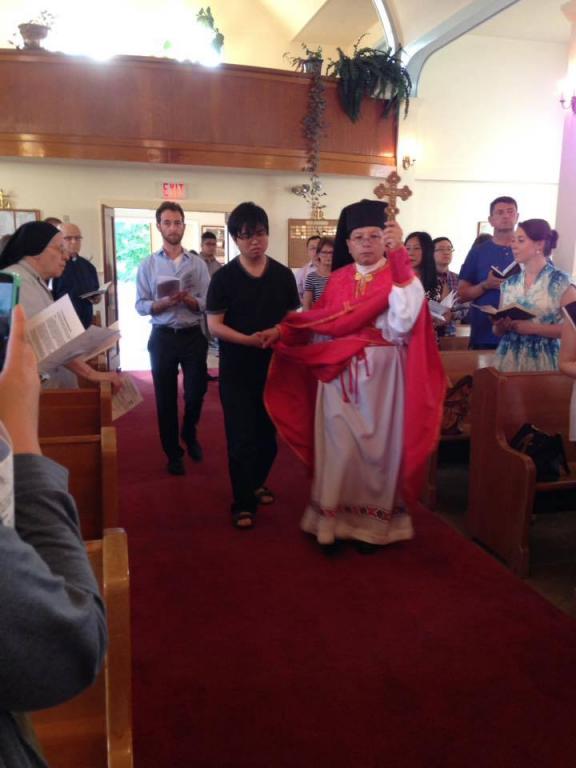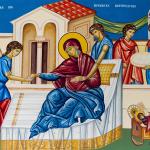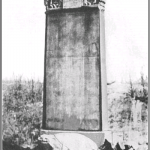
On this Sunday Before the Exaltation of the Cross, our temple in Richmond will receive our sixth person this year into our Eastern Catholic church. The first was the baptism of a Japanese Canadian guy who was getting married to someone who was already Eastern Catholic. The next two came in June; those were a Cantonese couple whose way into our church had been similar to mine insofar as they were moved by our support of Hong Kong’s Umbrella Movement in 2014. In August, we received by ascription a man from Japan who had been part of the Latin Church, and we baptized his son too. Today, we will chrismate a woman from China.
We are a temple in the Kyivan Church. As these people who have become dear friends enter this church, I am reminded of that feeling I had at my chrismation two years ago. I had come home, I felt, but it had not altered my ethnicity because I never felt that I was joining an ethnic church. Of course some people tried to warn me when I was doing so that Greek Catholicism can be a smattering of ethnic strongholds, and during my mystagogy – which was after my chrismation – I did get a front row seat to some of that when I struggled to find my place among the only Eastern Catholics that I knew in Chicago, Ukrainian Americans. It was from this struggle that the informal group known as the Kyivan Psychoanalysis Study Group was formed. The great thing about that group is that we are also not all ethnic Ukrainians; if anything, we are a broad-based anti-racist collective.
But at my chrismation in Richmond, I did not feel any of that difficulty. In fact, my biological father, an Anglican priest, read Psalm 66 in Cantonese as I was being led on my spiritual father’s epitrakhil into the sanctuary. When we received our Japanese friends into our church, we changed all the Lord, have mercy responses to Shu, awaremeyo, and we also learned the Trisagion in Japanese too. We usually have enough Mandarin and Cantonese in a regular Sunday liturgy for people to suspect that we are indeed the famous ‘Chinese mission’ that the joke character Michael Schurr asked the Canadian Ambassador to Ukraine about on the Ukrainian satire show Toronto Television. The thing, though, is that we are not a Chinese mission. We are a neighbourhood church in Richmond, and as our reception record shows, truly, everyone is welcome, and if you hang out with us, we will try to speak your language too.
The popular tagline in the Greek-Catholic Church of Kyiv is that we are not a church for Ukrainians, but a church from Ukraine for the world. Whether or not we are always good at living up to this motto is another story, but if my experience, which is corroborated now by my friends who are freshly into their mystagogy (as well as more people coming through our catechumenate pipeline, for that matter), is anything to go by, it’s that this church demands that you become the truest person that you actually are. Everyone has a role in the liturgy, and for things to run smoothly, there’s very little room for second-guessing. Like blogging, the lightning-fast pace of our liturgical drama requires the body to lead the mind, not the other way around. You learn quickly what you are good at and what you have no capacity to improve on: singing, reading, serving, cantoring, listening, praying, organizing, cooking, writing, and so on. You can only do that in which you are competent, and when you are working from muscle memory most of the time, your truest self is exposed, with no lag time for edits.
Everything else is economia, the whole house with all of one’s sisters and brothers in the temple managing it together. Two days ago, our kleros in Richmond – the group of singers who lead the congregational singing – found ourselves confused by the rubrics for today’s chrismation. We had thought that it was a straightforward Divine Liturgy, perhaps with some added treats from the postfeast of the Nativity of the Theotokos, and proceeding with our assumptions, we prepared. But as we looked more deeply into it, we found that there was only one prokeimen in the Liturgy of the Catechumens – the psalm verse preceding the reading of the Apostol – and it did not correspond to any of the tones for either the Sunday or the postfeast. It took a few minutes for us to clue in that it was actually the Sunday Before the Exaltation, so after the Little Entrance, everything switches over to anticipate that Feast. Go team, I thought, when we figured it out.
That prokeimen, incidentally, encapsulates what I’m trying to describe here: Save your people, O Lord, and bless your inheritance. My friend Julian Hayda tells me that that word inheritance is a tricky translation from the Slavonic. It’s not about the passing down of material assets or even a kind of legacy or heritage. Like the Anglicans who also use the word if they are in the habit of using the Book of Common Prayer, the inheritance is the people who bear the name of the Lord, and it is especially poignant as we anticipate the Feast of the Exaltation of the Cross that we remember that that name is tied to the sign of the cross. Unto you I will cry, O Lord, the prokeimen continues, lest you turn from me in silence. The image that this verse invokes is our crucified Lord crying out to the Father. We bear his name. We are crucified with him.
We should not lose sight of the irony of these reflections. Make no mistake: the Exaltation of the Holy Cross was an imperial act in Byzantium. Not only does it celebrate the Emperor Constantine’s mother Helena having found the relics of the True Cross in her pilgrimage to Palestine, but it also commemorates the victory of Constantinople against the Persians in contest over the possession of the wood of the Cross. It was the people of the imperial city who gathered under the exalted cross. They had, after all, conquered in this sign. In hoc signo vinces, it had been revealed to Constantine. The cross was the sign of symphonia between imperium and sacerdotium.
But Byzantium has fallen, and in its place have many claims to empire been made. The modern equivalence between the imperialism of old and the contemporary nation-state has been especially problematic, in the sense of it generating new problems for which solutions are difficult to discern. This week, the Orthodox world has been thrown into confusion by the Ecumenical Patriarchate confirming that it plans to give the Church of Kyiv autocephaly. I have long been supportive of this move, but I recognize the problems that it confers as well. The accusations will be made that all that this is doing is granting legitimacy to yet another national church. A more thorough understanding of history, however, will demonstrate that this accusation doesn’t take into account the full picture, which is that Kyiv has always been considered the canonical territory of Constantinople, not Moscow, and that not granting Kyiv autocephaly after all she’s been through would be tantamount to legitimizing Moscow’s claims as a national church to erase political borders and expand its state’s national boundaries with little limit.
However, the point that I am trying to make is even further than this one, and it is that the Kyivan Church is Catholic. Currently, the church of us Greek Catholics is one of the four ways that the children of the Holy Equals-to-the-Apostles Volodymyr and Olha are split, but as our Patriarch has made clear, it is our hope that we will be reconciled with our sisters and brothers who share the same spiritual inheritance. But all the other persons that I’ve described coming into our church in Richmond, including me, are part of this people too. Spiritually speaking, we too are Prince Volodymyr and Princess Olha’s spiritual children, and we are not ethnic Ukrainians. Our belonging together demonstrates that our church is truly Catholic because it is not an ethnic church because a church based on ethnicity is not a church, as the Synod of Constantinople declared in 1872 when it condemned ethnophyletism, the ecclesial racism that links ethnonationalism to a church.
Our church, like our sister church in Rome and our mother church in Constantinople, is Catholic because Christ is among us. Indeed, as the Holy Hieromartyr Ignatius of Antioch wrote to the Church of Smyrna, where Jesus Christ is, there is the Catholic Church. The Lord is present, he reminds us in the Feast that we anticipate, in what the Holy Apostle Paul called the word of the cross, describing the Apostle’s resolve to know nothing, as he tells the Corinthians, but Jesus Christ and him crucified. As the Lord tells his audience in the holy Gospel according to St John the Theologian, it is by being lifted up that he draws all people to himself, and the Theologian comments that by this, he indicated the kind of death that he would die. The holy cross is our salvation because it breaks down the barriers among the nations and calls all people to share in the risen life of the one who was crucified. To be marked with the sign of the cross means that our church is in itself universal, gathering people irrespective of ethnicity in our liturgical worship. We are not an ethnic church because we are Catholic.
Perhaps one way of describing the redemptive process in our tradition is that it is as if we were defaced icons now being restored. With the image of Christ shining through our bodies, we become more ourselves as we pray. Our false consciousness is negated by the cross by whose sign we are marked, and we understand ourselves to be the Lord’s inheritance, the people that he has saved. In the cross, in the cross, we might dare to sing with the evangelicals, be my glory ever, till my raptured soul shall find rest beyond the river.












